Photographs: Paulo Whitaker/Reuters
A former Marxist guerrilla who was tortured and imprisoned during Brazil's long dictatorship has taken over as president of Latin America's biggest nation, a country in the midst of an economic and political rise.
Dilma Rousseff was sworn in as Brazil's first female president on Sunday. The 63-year-old assumed the presidency in Brazil's Congress after a short motorcade ride under steady rain during which she waved to an estimated 70,000 well-wishers lining Brasilia's streets.
She will lead a nation on the rise, a country that will host the 2014 World Cup and that is expected to be the globe's fifth-largest economy by the time it hosts the 2016 Summer Olympics. It has also recently discovered huge oil reserves off its coast.
Click on NEXT to read Dilma's story...
Ex-revolutionary, cancer survivor, now a President
Photographs: Reuters
At 16, she moved to a public school, the Central State College (now State School Governor Milton Campos). Then begins the military as a sympathiser in the Marxist Revolutionary Organization -- Political Workers, known as Polop, leftist organisation contrary to the line of the PCB (Brazilian Communist Party), formed by students who lean towards the thought of Rosa Luxemburg and Leon Trotsky.
Later in 1967, already attending the School of Economics, Federal University of Minas Gerais, Dilma began military Hill (Command of National Liberation), an organisation that advocated armed struggle. This behaviour, of passing from one to another political group, was common in leftist movements that were active during the dictatorship began with the coup of 1964.
She was a card-carrying member of the resistance in the mid 60s, involving herself with such far-left wing guerrilla groups as the Vanguarda Armada Revolucionaria Palmares (Palmares Armed Revolutionary Vanguard).
Following capture in the early 70s, she was subjected to torture at the hands of the political police after a summary trial that did not include such niceties as a lawyer.
Ex-revolutionary, cancer survivor, now a President
Image: File photo shows Dilma Rousseff posing after visiting a wind power plant in the city of Osorio in southern Brazil on November 30, 2007Photographs: Jamil Bittar
She was sent to the Tiradentes prison, where she spent nearly three years and was submitted to brutal torture.
Dilma was beaten to the point of heavy bleeding, underwent electric shocks and spent hours on the "parrot's perch" -- a painful stress-position involving tying wrists to ankles, then suspending a prisoner off the ground by running a pole under their knees and over their biceps.
The conviction was later overturned at her request by the Special Commission for Reparation of Human Rights.
In late years of the military regime, Rousseff fought for amnesty for citizens who had lost their civil rights and were persecuted by the government, and took part in the founding of Democratic Labour Party in Brazil's southern region.
Ex-revolutionary, cancer survivor, now a President
Image: File photo shows Dilma Rousseff gesturing as she speaks to the media after leaving a hospital in Sao Paulo May 20, 2009Photographs: Paulo Whitaker/Reuters
Close to important Brazilian political leaders, such as Leonel Brizola, she played a decisive role in the movement called Diretas Ja (Direct elections now), the largest civil mobilization in Brazilian recent history culminating with the return of democracy.
She graduated in 1977 with a degree in economics. In the late 1980s, she was appointed secretary of mines and energy of the government of Rio Grande do Sul, which made her known in the whole country.
In 1993, she was named secretary of energy for the state, and pulled off the coup of vastly increasing power production, ensuring the state was spared the power cuts that plagued the rest of the country.
She had 1,000km of new electric power lines, new dams and thermal power stations built while persuading citizens to switch off the lights whenever they could. Her political star started shining brightly.
Ex-revolutionary, cancer survivor, now a President
Image: File photo shows Luiz Inacio Lula da Silva and Dilma talking during the inauguration ceremony of Institutional Relations Minister Alexandre Padilha at the Itamaraty Palace in Brasilia September 28, 2009Photographs: Roberto Jayme/Reuters
But in 1994, after 24 years together, she separated from Mr Araujo, though apparently on good terms. At the same time she was torn between academic life and politics, but her attempt to gain a doctorate in social sciences failed in 1998.
In 2000, she joined hands with Lula and his Workers' Party. She was appointed Minister of Energy during the first term of President Lula, which began in January 2003, and in June 2005 she assumed the post of Chief of Staff.
Since Silva took office in 2003 through the end of last year, 20.5 million Brazilians escaped poverty and 29 million entered the middle class, according to a study released this month by the private Getulio Vargas Foundation economic think tank.
During her tenure as chairman of the Board of Directors of the state-owned oil company Petrobras, Brazil reached self-sufficiency in oil production and mega reserves were discovered in the pre-salt layer of Brazil's seabed, which may turn the South American country into a large oil exporter.
Ex-revolutionary, cancer survivor, now a President
Image: File photo shows Dilma talking to journalists during a news conference in Sao PauloPhotographs: Nacho Doce/Reuters
Dilma was handpicked by president Lula himself to run for his succession and in April this year she left the post as chief of staff.
According to the Independent, Dilma's victory in the presidential poll will be greeted with delight by millions. It marks the final demolition of the "national security state", an arrangement that conservative governments in the US and Europe once regarded as their best artifice for limiting democracy and reform.
It maintained a rotten status quo that kept a vast majority in poverty in Latin America while favouring their rich friends, the report said.
In April 2009 she was diagnosed with lymphatic cancer -- a condition of which she has since been pronounced "cured".
From a militant to becoming Brazil's first female president, Rousseff says her political thinking has evolved drastically -- from Marxism to pragmatic capitalism -- but she remains proud of her radical roots, says the New York Times.
"We fought and participated in a dream to build a better Brazil," she said in an interview published in the newspaper Folha de S Paulo in 2005, one of the rare times she has spoken in detail about her militancy and torture endured.

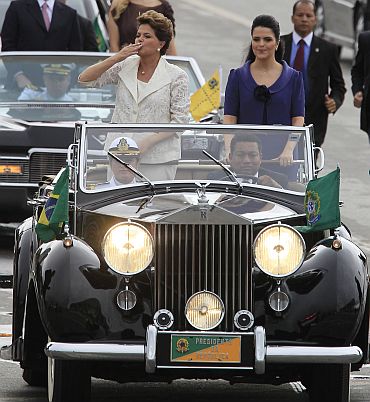
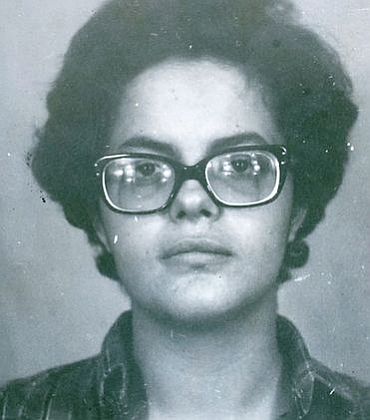
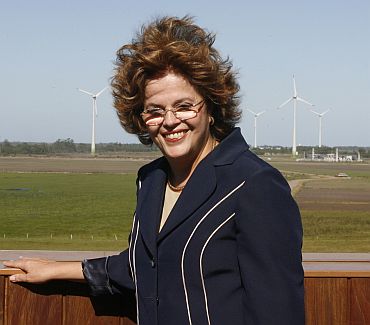
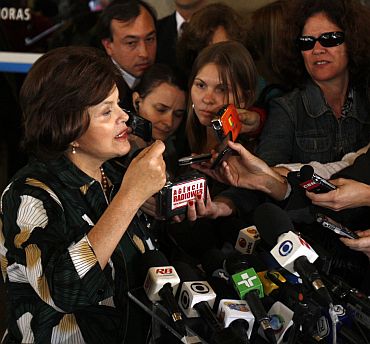
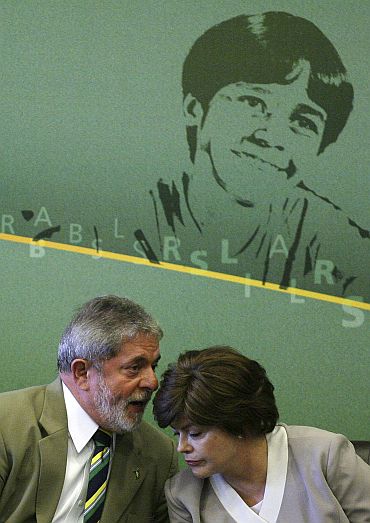
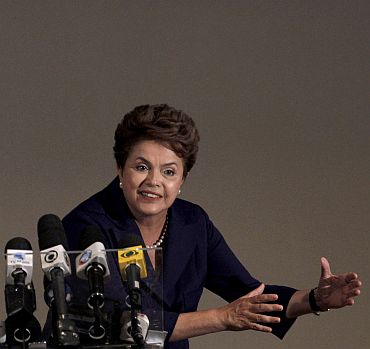
article